"We get into the habit of living before acquiring the habit of thinking."
~ Albert Camus
Tuesday, October 31, 2006
Missing Wisdom
On Friday I went in to have all four wisdom teeth extracted. Before I knew it, a mask was placed on my nose, my brain lost a grasp on whatever it was I'd been thinking and I passed out. When the nurses woke me and led me back to a bed to lie on, I was furious they hadn't performed the surgery yet - why were they making me wait? A lick of my blood-encrusted lips told me that time had lied and they were already done. I began to sob.
The nurses took me back to a chair to do some last minute things to my face. Why awaiting their final attentions I said, "Gosh, I'm really gonna miss my teeth!" (Har har). When they looked blankly back at me and asked why, I stated simply, "well, I was sorta attached to them for a while..." Perhaps they thought that no one could possibly make a pun while high on as many painkillers as I (or maybe they couldn't appreciate my ridiculously obvious sense of humor) because they fumbled in the back for a moment and then handed me four bloody molars sealed in a plastic bag. Think the tooth fairy pays for big people teeth too?
I spent the weekend enjoying pudding, jello and eventually pizza. The oxycodone helped a lot. I actually thought I'd weathered the whole experience rather well until I spoke with some friends today. Apparently I had a lot of conversations that I don't really remember having...
Good thing I was blogging on those days!
Sunday, October 29, 2006
Impassioned?
The other day, during a routine physical, I recommended my doctor read Tracy Kidder's Mountains Beyond Mountains. I figured that as a doctor, a story about a man who treats infectious diseases might appeal to him. He replied that not only did he not have time but that my passion did not need to become his passion. This struck latter assertion struck me with some force.
Why would I care that he didn't care? Why would I care that a friend won't be coming with me? It occurred to me: precisely because my passion must become his passion -- his or hers any body else's. How can someone make a difference if they can't interest others in their passion? It seems my challenge begins even before I step foot on the island again.
Contributions anyone?
Saturday, October 28, 2006
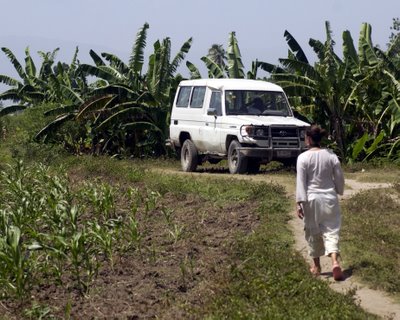 I prepare for my trip with vaccinations, medications, supplies, goodbyes. Time creeps on some days and on others slips through my fingers without notice. For the first time in my life, I am taking a step on my own. The decision feels completely natural and yet terrifies me.
I prepare for my trip with vaccinations, medications, supplies, goodbyes. Time creeps on some days and on others slips through my fingers without notice. For the first time in my life, I am taking a step on my own. The decision feels completely natural and yet terrifies me.My home will be a small room on a farm in southern Haiti. My family will be an eclectic group of Haitian children, families, American and Canadian expats, priests and a smattering of volunteers. I cannot even fathom the extent to which my life will change...
Thursday, October 19, 2006
Philosophizing Winos
Conclusion: The Earth is large, the Universe is larger; the higher you reach, the farther you fall; the first steps toward the next step are the most difficult ones to take.
Monday, October 16, 2006
as a White House Intern...
I was born and raised in Washington, DC. I went to Catholic church every Sunday as a kid - sat listening to homilies with major politicians and talking heads from both the left and right. I studied at a liberal Episcopal high school and attended an even more liberal university in the north. My only exposure to the Christian right, even after Bush and his constituency took over the capital, was an occasional visit with my distant southern cousins. From my limited experience, I formed an idea of what to expect from the Christian right - kind and carefully thought out words, a humble attitude and speech laced with phrases like "God willing" and "I was so blessed."
In the fall of 2005, I served as a White House intern at the USA Freedom Corps Office, a political office located right next to the Faith-Based office on Lafayette Park. The first few days, all the interns sat through talks by various directors and senior staff. The bottom line of all these lectures was - act respectfully and in accordance with the position of privilege to serve in the White House. One director told us that we would now be appealing subjects for reporters because of our proximity to the West Wing. For some of my fellow interns from the mid-west, Utah, and central Texas, this "Washington Post test" was a totally new thing - so this was an important point to make.
I don't know what parallel universe Kuo occupied during his time at the White House but my limited exposure to the people on every level of the Bush Administration was completely different than his. My colleagues spoke of being "blessed" by good fortune, exclaimed "good NIGHT!" when surprised, showed discretion and a deep understanding that their position at the White House meant they were serving the American people. I was constantly reminded that my colleagues and fellow interns came from a different background than I. For the most part, they came from the Christian right and acted just as I expected they would.
Kuo certainly does not exhibit the behavior I witnessed in my semester at the White House. He does not exhibit the humility and discretion I found in those I worked with. 60 Minutes leaped at the story of one of hundreds and hundreds of people who have served this administration - most of whom have known better than Kuo. His book(though perhaps not his moral fiber) ranks with that of Jessica Cutler who wrote Washintonienne - a steamy best seller based on her explicit blogs. Both he and Cutler did the easy thing, made their 15 minutes of fame by depending on their Washington insider advantage.
In Kuo's case, not only do I find him totally reprehensible for playing into the hands of a media eager to say ANYTHING bad about the Bush White House, even if it is contradictory (they're in bed with the Christian right, they mock the Christian right... blah blah blah) but I found him out to lunch in his observations.
Sunday, October 15, 2006
Precisely the Problem...
$53 million of fiscal year 2006 funds for USAID assistance programs
in Haiti, these funds are part of an overall Country Strategy Grant Agreement
(CSGA) covering the next three years (FY 2007 to FY 2009). The total
contribution under the terms of the agreement is estimated to be up to $492
million for all USAID activities that support the Haitian people during this
period.
That's a heck of a lot of money - but then, the U.S. has given a lot of money to Haiti before. According to the article "The United States is Haiti's largest single-country donor and trade partner..." And well, with that amount of money and the U.S. being "committed to work with Haitian citizens and their government over the long term" one would think that a population roughly the size of NYC would benefit greatly.
Where's the hitch? Some how when we read,
USAID will partner with the Government of Haiti to help meet the
basic needs of the Haitian population, focusing on job creation, community
revitalization and empowerment, local government partnerships, expansion of
financial services, watershed development, agribusiness and marketing, public
health care, AIDS prevention and treatment, education services, civil society
and media improvement, judicial and parliamentary systems reform and improved
governance and fiscal policy.
it's hard to believe that it'll come to fruition. Some how, not all the money makes it to the projects for which it's intended. Of course, given the level of destitution there, if even a little of that money trickled down to the outrageously poor we could see a difference.
Unless those who bestowed the 2006 Nobel Peace Prize on Bangledeshi Muhammad Yunus were completely out to lunch, perhaps the U.S., her wealthy and her large non-profit organizations should look closer at this different model for giving. Using the concept of microfinance, Yunus and the Grameen Bank he founded hope to "lift millions out of poverty." If, for example, Madonna, Angelina Jolie and others looked around our Hemisphere for a moment, they might see how some of their pocket change could work miracles on many many children (not just the ones they decide to walk away with). If the money went straight into the hands of the needy...
Friday, October 13, 2006
I'm having trouble seeing past this plank!
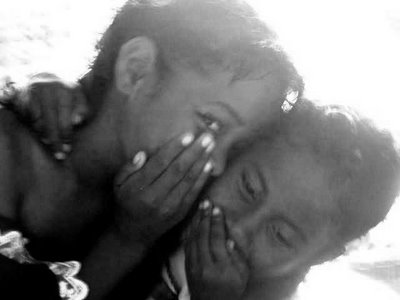
Another friend of mine lived in Micronesia for 2 years. As part of her JVI experience, she tried to live in solidarity with the people and to strive for "simple living." She succeded in these: Coming back to the states left her in a bit of a reverse culture shock.
Yesterday a story was posted on the Pwoje Espwa blog about the latest additions to the Espwa family. The entry reads:
Meet the newest members of the family, Rolider and David Smith.
Their story is too common. The boys had been having stomach problems for
sometime but their family had no money to pay for a visit to the hospital.
Rather than watch the boys suffer their mother made the only choice she could,
take her children to the hospital and abandon them there, hoping and praying
someone would come to their aid. Thankfully Agnes Fednor of Terre de Hommes,
another relief agency in the area, found them, paid for their medical treatment
and watched over them during their hospital stay. After a week Agnes brought the
boys to us and asked if we could take them in. Rolider and David are now
continuing to recover in our care and should be ready to start school next week.
Please keep Rolider and David in your prayers, and especially their mother who
was faced with a choice no one should ever have to make.
Surviving in Haiti will mean changing my frame of reference, my expectations for a "good" day, my capacity to love, my perceptions of reality. We got it so good in this country...
photograph of Micronesian kids taken by Ashley
Wednesday, October 11, 2006
Burning up the Screen...
In recent years, the internet and the blogosphere have begun to have great impact on political and national events. A video posted on Utube and circulated on emails and blogs has lasting impact on the fate of a politician. Opinions glibly scripted on thousands of online journals have the potential to change the way we revere or ignore the nationally syndicated press.
The beauty and bitch of the blogosphere are difficult to separate. The qualities that allow users to create their own voice and use a virtual space to their advantage also allow them to disregard the potential for a very public readership. Ultimately, it comes down to whether the person who sits down at their keyboard feels a responsibility to resist the ease of contributing to useless garbage, harmful slander or plain filth - all too accessible on the net.
For me, making a transition from journal-keeping to blogging requires the simple commitment that the activity would occur daily, a pledge to a potential readership. And the blog, even more so than the journal, must exist in a detached reality - rants structured and veiled, experiences wrapped in external observation, daily activities concealed. But so long as the new venue remains oriented toward personal experience, and away from detached observation of national and international goings on, "Inside the Frame" cannot resemble "Wonkette" or "Instapundit" (examples of some who take the blogosphere by storm).
On the other end of the spectrum from these practically syndicated web logs are those that post what one expects from a young teenager's locked diary (in many cases, the blogger is in fact a rash youth, in other cases one must puzzle over the author's excuse). Examples of the latter are too numerous to count but often include such preambles as "I decided to create this Blog because sometimes all you can do about something is to write about it" or something less premeditated. As much as "Inside the Frame" fails to resemble a popular web-pundit, it fails to resemble these.
Perhaps it was growing up in DC and intrinsically understanding that one does not write (or even sometimes say) what one could not stand seeing in the Washington Post the next day. Perhaps it was growing up Catholic and with a sense of shame that what I wrote might someday be read by my mother or grandmother. Perhaps it was the good horse sense to know that people often forget what's said: "Believe half of what you read and none of what your hear," my grandma always told me. Perhaps it was a combination of all these and many other factors - but I never did understand the brashness that some of my contemporaries exhibit when they record every red letter of activities and thoughts they may later live to regret.
Tuesday, October 10, 2006
Disaster Relief for Southern Haiti
Though the 2006 Hurricane Season is winding down, it is by no means over. Accuweather offers a great way to see what's coming up from the south - you can track hurricanes and their intensity level via satellite imagery. I checked this religiously before my last trip to Haiti. During my first night there when I awoke to the incredible sound of crashing thunder, heard the wind outside and the rain pounding on the roof, I felt secure in knowing it was only a passing storm. The elderly man I stayed with told me, as I sat sipping strong coffee, that he awoke during this night as well and was sure a hurricane was blowing through.
It has only been recently that those living in rural communities in Haiti have had the luxury to
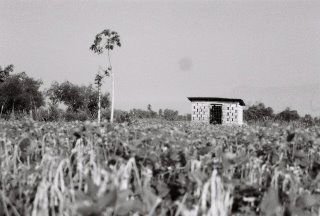 check the weather online. While touring the "computer lab" at Kay Espwa in Les Cayes, Fr. Marc told how when he first moved down they would just lie awake at night and wonder if the storm blowing through would become a hurricane or not. With weather tracking technology and equipment (computers, satellite dishes, telephones) brought in by the Emergency Operations Center, communities in the path of deadly tropical storms should be a lot better off. These are small steps... but steps just the same.
check the weather online. While touring the "computer lab" at Kay Espwa in Les Cayes, Fr. Marc told how when he first moved down they would just lie awake at night and wonder if the storm blowing through would become a hurricane or not. With weather tracking technology and equipment (computers, satellite dishes, telephones) brought in by the Emergency Operations Center, communities in the path of deadly tropical storms should be a lot better off. These are small steps... but steps just the same.Monday, October 09, 2006
Across the Shining Sea
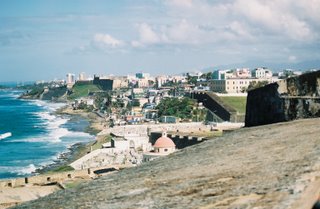 Taken from atop "el Morro," the common name for Fort San Felipe del Morro in Old San Juan, Puerto Rico, this photograph shows ancient gravestones, the old Spanish-style city, the taller modern city and hazy mountains all set on a bay bluer than any gem. Standing here and looking out at this vista, one can imagine why men bled for this land.
Taken from atop "el Morro," the common name for Fort San Felipe del Morro in Old San Juan, Puerto Rico, this photograph shows ancient gravestones, the old Spanish-style city, the taller modern city and hazy mountains all set on a bay bluer than any gem. Standing here and looking out at this vista, one can imagine why men bled for this land.A brief comparison helps in understanding this island and its neighbors. Some of the vital stats of the Caribbean islands:
Haiti (independence from France 1804) - $1,700/capita; life expectancy 53 yrs.
Martinique (department of France) - $14,400/capita; life expectancy 79 yrs.
Guadeloupe (department of France) - $7,900/capita; life expectancy 78 yrs.
^Dominican Republic (independence from Haiti 1844) - $7,000/capita; life expectancy 71 yrs.
Cuba (independence from Spain 1898) - $3,500/capita; life expectancy 77 yrs.
^Puerto Rico (unincorporated US territory) - $18,600/capita; life expectancy 78 yrs.
Jamaica (independence from UK 1962) - $4,400/capita; life expectancy 73 yrs.
The Bahamas (independence from UK 1973) - $20,200/capita; life expectancy 65 yrs.
St. Lucia (independence from UK 1979) - $5,400/capita; life expectancy 74 yrs.
Barbados (independence from UK 1966) - $17,000/capita; life expectancy 73 yrs.
Trinidad and Tobago (independence from UK 1962) - $16,700/capita; life expectancy 67 yrs.
^initially, Spanish colonies
For comparison:
United States (independence from UK 1776) - $41,800/capita; life expectancy 78 yrs.*
 Of course - the list above omits Aruba and the Virgin Islands - and these wealthier still than Puerto Rico in GDP/capita. The former gained independence in the 1980s from the Netherlands and the latter are governed by the UK and USA. These islands still follow in the trend. Perhaps it was the organization system set up by the Brits, or the fact that they stubbornly held on to their colonies the longest but those islands that were under British rule seem generally better off.
Of course - the list above omits Aruba and the Virgin Islands - and these wealthier still than Puerto Rico in GDP/capita. The former gained independence in the 1980s from the Netherlands and the latter are governed by the UK and USA. These islands still follow in the trend. Perhaps it was the organization system set up by the Brits, or the fact that they stubbornly held on to their colonies the longest but those islands that were under British rule seem generally better off.The study of "Europe and its Others" could take longer than a lifetime - but a look at some stats and a visit to some of these "Others" reveals something of state of affairs in these countries before their liberation. Looking at a picture of Haiti's capital
 lays bare the painful difference between a (comparatively) wealthy island and the poorest of the islands.
lays bare the painful difference between a (comparatively) wealthy island and the poorest of the islands.The Caribbean islands explode with color and music, lush jungles and craggy mountains. The music - from Salsa to Reggae to Copa - exudes the contagious spirit of the people. Though my travels within the Caribbean have taken me only to the poorest of Western nations (Haiti) and to Puerto Rico - drinking the coffee, sipping the rum, tasting the fruit and talking with the people betrays a potential that none of these islands have reached.
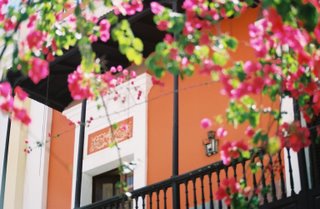 *from the CIA World Factbook
*from the CIA World Factbookphotos by Portia!
Friday, October 06, 2006
Out of the Mouths of Babes
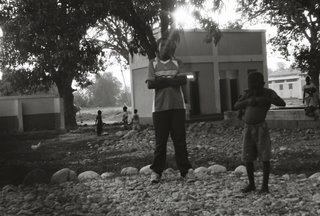 The camera lens acts like a special filter, seeing and capturing things that the naked eye won't. A photograph tells a truth - but a particular truth with an unclear (but real) bias. Esteeming the work of only one photographer is like saying there is only one side to the story. And while photography is an art, it is an easily accessible one for the very reason that many contributors help to create a fuller picture.
The camera lens acts like a special filter, seeing and capturing things that the naked eye won't. A photograph tells a truth - but a particular truth with an unclear (but real) bias. Esteeming the work of only one photographer is like saying there is only one side to the story. And while photography is an art, it is an easily accessible one for the very reason that many contributors help to create a fuller picture.Lest we forget the feeling of looking straight into the bellybuttons and belt buckles of our elders, craning our necks while talking to teachers, and fitting comfortably on the hips of our caretakers, this photograph of two boys in the sun stands as a reminder. Captured on film by one of my little Haitian friends, this scene tells at once as much about the subject as the photographer - who didn't wait for the "perfect" moment to activate the shutter, who held the camera a slight angle, who didn't bother or know to fix the settings.
As we grow, we not only forget what it was like to be young mentally, we forget what it felt like to be short, small, invisible in a crowd... Putting a camera in the hands of a child and
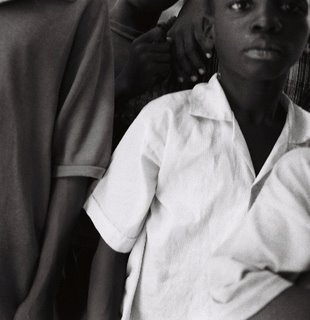 letting a lens do the looking opens a chapter in a book that closed as we entered adolescence. The picture to the right, by another youngster at Pwoje Espwa, betrays a vulnerability difficult for any adult artist to convey.
letting a lens do the looking opens a chapter in a book that closed as we entered adolescence. The picture to the right, by another youngster at Pwoje Espwa, betrays a vulnerability difficult for any adult artist to convey.Photographer Jeffrey Mills (no relation - but hailing from a town not too far from that of my Canadian ancestors) started a project called The Young Haitian Documentary Photographers Group - "social justice through art."
Before this trip [to Haiti], Jeff watched the documentary film "Born into
Brothels." He was inspired. Amazing things can happen when cameras are put into
the hands of youth. Although the purpose of his trip was to volunteer on a road
crew in the mountains above the town of St. Marc, Jeff also brought cameras and
conducted two photography workshops for students. This was the first time these
young photographers had used cameras.
This Canadian photographer helps enable the voices of the Haitian youth and gives their voices a platform.
Thursday, October 05, 2006
Becoming a "Blogger"
Recently my little brother Tony has jumped on the bandwagon with his Pitch 2 Voltage. True to his passion, he posts about new music albums, concerts and anything music related. Then there's me - who recently joined the electronic community in order to talk about my upcoming trip to Haiti and ultimately to use the blog as a venue to write about my projects and experiences there -- photographs always being integral to this endeavour.
The three blogging siblings have emailed back and forth over the last weeks - passing tips and ideas back and forth. Today my older brother told me that he'll be posting about my blog in the coming days. Since popularity in the blogoshere seems to hang on other bloggers posting on, linking to, and commenting on your own blog, this is a very good thing.
Bottom line - since the last week and a half, the slow transformation from casual-Internet-browser into blogger-extraordinaire is in effect.
Wednesday, October 04, 2006
Solving the "Right" Problems
Question: Why do major global organizations fail to have major national impact in Haiti?
Answer: They seek to solve the wrong problems.
Haiti has not come far in the 202 years since its independence. Some would argue that it has taken steps backward in the last half of the 20th century. The lack of progress in the second oldest independent republic in the Western Hemisphere is truly shocking... especially in consideration of its proximity to the United States. So what gives?
Nicholas Eberstaldt , Henry Wendt Scholar in Political Economy at American Enterprise Institute (AEI), writes eloquently of his visit to Port-au-Prince this past summer. In his recent publication he paints a positively tragic portrait of the Haitian capital that might be unbelievable to any who have never visited a Third World country:
...Port-au-Prince is not too poor to have sewage: That humid choking stench is
everywhere. Unending makeshift shacks stretch from clogged "canals," through
which water the color of petroleum slowly trickles: This is at once the communal
latrine and the water supply for washing the evening's cookware.
This is one of several other descriptions in the article that serve to show the reader the unimaginable extent of the need in Haiti. Eberstaldt points out the major global organizations in play. Of the UN troops sent through MINUSTAH (United Nations Stabilization Mission in Haiti) he remarks, "As for MINUSTAH and their 8,800 soldiers and police, some Haitians have taken to calling them TOURISTAH," which completely validates my observations in the south. According to him and others, the Haitian government and other legal statutes limit UN's efficacy. The troops often end up with much time to lounge.
Eberstaldt also notes the long term monetary commitment of both USAID and World Bank to the island nation over the years:
Haiti received a cumulative total of about $3.5 billion (in 2004
dollars) in American aid (economic and security assistance) between 1946 and
2004--that is to say, over the roughly six decades in which its per capita
output achieved a decline of 25 percent. U.S. aid, moreover, was just one of
many sources of concessional official transfers to Haiti. According to the World
Bank, since 1969, Haiti has enjoyed a cumulative total of $8.3 billion in
official development assistance (measured in 2004 dollars).
So in addition to troops, Haiti has access to funds. Does the money go to provide for the poor, feed the hungry, shelter the homeless, heal the sick, protect the vulnerable and educate the ignorant? It does not appear to.
The smaller grassroots non-profits make the greatest direct impact in improving the lives of Haitians. Eberstaldt's "Haiti in Extremis" mentions those few he noticed in Port-au-Prince - GHESKIO HIV Clinic, Mother Teresa's Missionaries of Charity - but there are others both in the capital and the country: Theo's Work in Les Cayes and Paul Farmer's Partners in Health in central Haiti, to name a couple. These organizations fill in where the government and larger non-profits fail.
AEI's political economy scholar points out a little discussed but enormously important fact: None of the efforts of Haitians or outside groups will stick without the security to protect them. This is where larger entities can do the most - and the U.S. may wish to take heed due to Haiti's proximity and reputation for hosting drug-runners. To end on a dreary note:
Without security, efforts to better the national plight will be
doomed to frustration, or worse. Foreign economic assistance will be mainly
wasted, or worse. Humanitarian assistance efforts will find themselves on an
endless treadmill. Economic and humanitarian assistance are no substitute for
security and safety--cannot substitute for it, cannot themselves create it. And
what holds for Haiti holds just as true for other tortured regions of the world
where governments receive foreign aid, but local populations do not receive
safety.
Tuesday, October 03, 2006
the Washingtonian Frame of Reference

From Washington, DC, one can fly direct - or with (tops) one layover - to almost any location on the planet. It is a bit of a small town, none-the-less, despite these and other metropolitan conveniences. And though located a solid five-hour drive South from New York City, America's capital appears far more up-tight - blue and black suits dominate a generally conservative environment. Maybe it's all the lawyers...
Growing up in a place like Washington gives natives a decidedly distinct approach to life. If two happen to discover each other at a gathering, they'll ask, "What school did you go to?" to determine high school (NOT college) education. Washingtonians also tend not to be intimidated by fame or power, but are certainly aware of it and can name (or manipulate) "celebrities" most people have never even heard of let alone seen.
The most difficult part about growing up with the Washingtonian mentality is learning to shift from an inside-the-beltway-centric outlook on life. Power lies in an ability to do this. A myriad of Washingtonians make great impacts on the lives of others - they are the ones who have learned from and harnessed the power that abounds in this city.
Of course, every country has its own characteristics and every capital city will reflect these in part. Washington houses thousands of people of political import from all over the world - this is probably reflective of the fact that (despite the world's hypercriticism), America is a place that many millions of people would like to be, to stay, or to visit. For those that can't - the American energy and spirit has much to offer. To refocus on tiny corners where change is happening as a result of precisely this is to witness miracles.
Monday, October 02, 2006
The Other 4-Letter "F" Word
I decided to take my manual camera on my trip to Haiti. A digital point-and-shoot wouldn't do - I wanted quality prints. For years I tried to stick to my guns about using my old Nikon - and as a consequence, it collected dust for years. Instead, I condemned all those other photographers that forsook the darkroom in favor of digital ease. Now I'm beginning to understand why a photographer friend of mine refers to film as that other dirty word beginning in "F."
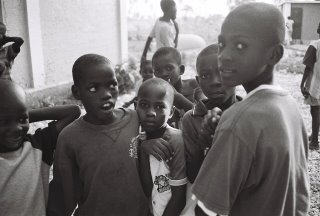 The most disappointing thing to these kids was that they couldn't see their pictures after I snapped them. Who would have guessed that an old manual camera would be such a novelty in a country like Haiti? For the return trip, the manual SLR will be traded in for a digital SLR. Going old-school gets more and more expensive every day...
The most disappointing thing to these kids was that they couldn't see their pictures after I snapped them. Who would have guessed that an old manual camera would be such a novelty in a country like Haiti? For the return trip, the manual SLR will be traded in for a digital SLR. Going old-school gets more and more expensive every day...